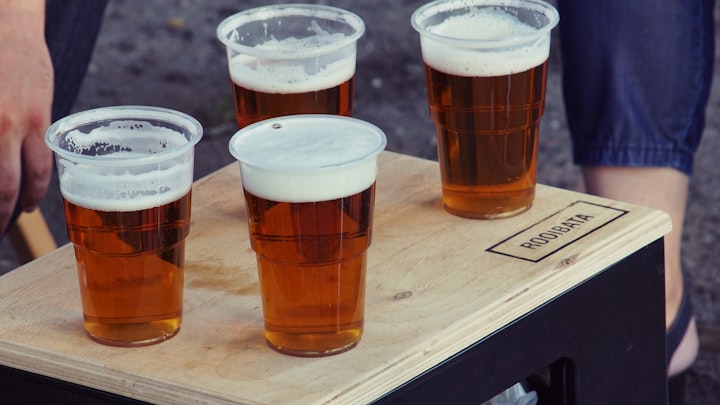
Alcohol penetrates our social fabric, making quitting seem like an impossible task. Anyone who has tried knows that alcoholic beverages can find their way into even the most unexpected occasions, whether it's a post-game beer or a round of padel. However, many of us have recognized the need to reexamine our societal conventions. Along with the increase in alcohol-free beverage alternatives, alcohol-free bars like Board in Dublin are appearing - yes, even in Dublin.
It is critical to recognize that alcohol is damaging to our health and can lead to weight gain. These realizations alone should encourage moderate drinking. If you're not sure what defines excessive drinking, it depends on things including gender, age, and weight.
As a healthy adult male, it is advised that you restrict your alcohol consumption to three glasses of wine (about 13% alcohol) or three cans of beer (33 ml) with a maximum of 5% alcohol each. The proposed maximum for spirits with more than 28% alcohol content is three glasses of 40 mL each. Women should aim for around half of these amounts. Adhering to these limits characterizes intake as moderate, however health hazards remain.
If you find yourself over these limitations, especially on weekends, try cutting back on a few drinks. Sometimes, depending just on willpower is insufficient to break behaviors that give brief pleasure. In such instances, obtaining help is recommended. We engaged three specialists in alcohol addiction therapy to provide suggestions for minimizing excessive drinking. While some tactics may appear easy, it's critical to pay attention because we sometimes ignore the most basic remedies.

Excessive alcohol use, when not associated with addiction, is usually motivated by a desire for pleasure. The initial desire for pleasure frequently causes persons to fight it by aiming for perfect abstinence. This conflict is similar to patterns seen with food: people may drink while feeling guilty, resulting in an inability to completely immerse themselves in the moment. Paradoxically, this lack of contentment feeds the want for more, so perpetuating the cycle.
One uncomplicated solution is surprisingly simple: "to reduce consumption quantity, one must elevate its quality." Choose a glass of quality wine from a respected cellar over a doubtful bottle, or have a gin and tonic made with premium spirits. If the flavor of alcohol appeals to me, I can set a goal for myself to learn more about the beverages I usually drink.

The appeal of alcohol goes beyond its flavor alone. Some people value the social component and the act of drinking as a way of bonding with friends. For some people, switching between alcoholic and non-alcoholic beverages might be useful. Nowadays, there are various good alcohol-free alternatives on the market.
After a moderate drink, we may keep camaraderie with friends while lowering our ethanol consumption by moving to an excellent non-alcoholic beer or a refreshing alcohol-free beverage.
Learning to give up something for oneself also teaches the valuable lesson of self-discipline.
Weekend hangovers are frequently perceived as a well-deserved reward after a week of hard work and sacrifice - a typical emotion among people seeking a sensation of lightness and moderate euphoria from alcohol.
In such cases, it's critical not to overburden the weekend with unrealistic expectations after waiting all week. Instead, try to infuse moments of well-being into every day. Apnea is a powerful metaphor for refraining from alcohol, stressing the value of sacrifice. We may fool ourselves into believing that refraining from alcohol would result in more satisfaction when we do indulge. However, this thinking can result in harmful binge drinking and lack of control.
So, how do we navigate this? According to a brief strategic approach, the solution rests in a rather counterintuitive notion: when it comes to pleasure, including alcohol use, we must first realize that engaging in it is the greatest way to govern it. However, this restriction must be intentional, with particular times set apart, almost like a ritual. The reasoning is straightforward: if we give ourselves pleasure, we also have the ability to refrain. Conversely, if we deprive ourselves or indulge excessively, it may become an unbreakable habit.
Avoid internal conflict whenever possible

Finally, combating excessive drinking requires a realistic method. Begin by paying attention and responding to the cues your mind and body tell you. These warning signals indicate when your alcohol usage is drifting off course. In addition, fight the impulse to compete with yourself. The route to creating a healthy relationship with alcohol may be difficult, and competing with oneself just adds to the internal struggle.
Instead, prioritize actions that promote harmony and balance. Instead of pushing conflicting inclinations against one another, work to integrate them in a way that fosters general well-being. If navigating this route appears daunting or insurmountable, don't be afraid to seek help from an expert. They can offer essential insights and assistance targeted to your specific requirements, allowing you to create a better relationship with alcohol.
Thank you for reading.
See you next time!
Wero






Comments
There are no comments for this story
Be the first to respond and start the conversation.